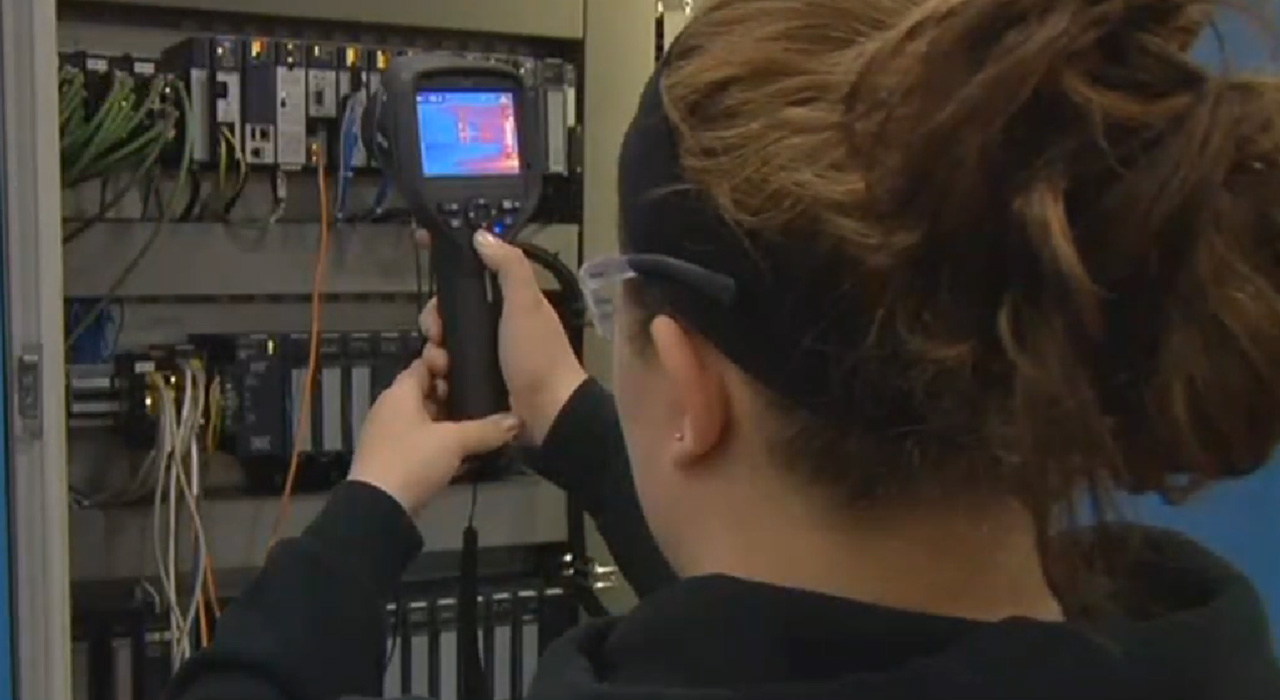
[vc_row][vc_column][vc_column_text]Inside Building 3 at General Electric’s massive Appliance Park, about a dozen high-powered robots pump their arms up and down as they shape stainless steel into tubs that line the inside of GE-made dishwashers.
The only humans involved in the process are Greg Fentress, a white-haired maintenance technician who has worked for 24 years at Appliance Park, and Aliza Schmitter, a recent high school graduate from Southern Indiana.
With Fentress as her guide, the 19-year-old Schmitter sticks her head into the closet-like electrical panel at the base of the giant machine. Using a handheld voltage meter, she checks for loose connections among the thousands of electrical wires inside the panel.
The purpose? To keep the machine – and thus GE’s dishwasher line – up and running.
“If there is a problem and we don’t find it, it could put you down for an hour, or two hours, and then we’re talking big money,” Fentress said.
Fentress, 59, is also training the person who might one day replace him.
Schmitter is one of 11 recent high school graduates in the first local class of a program called jctc
Kentucky FAME – or Federation for Advanced Manufacturing Education.
Schmitter, who lives in Jeffersonville, shows up to Appliance Park by 5:30 a.m. three days a week and follows maintenance technicians like Fentress around the plant.
The other two days, she’s tinkering with motors and other machines inside a lab at Jefferson Community and Technical College’s downtown campus at 8th and Chestnut streets.
In about two years, or five semesters, Schmitter and the other students will earn an associate’s degree in industrial maintenance while getting job experience at one of six factories in Louisville.
Upon exiting the program, they’ll be in line for jobs fixing and maintaining the equipment that powers production lines at plants.
Despite pay starting around $50,000 a year and the potential to earn more than $100,000 with overtime, these “middle-skill” jobs face an acute shortage of qualified workers as baby boomer-generation employees retire, said JCTC instructor Gerald Sexton, a former maintenance manager for Goodyear tire plants in Alabama and Virginia.
“Really the only way to get skilled people is from other businesses around Louisville… Our gain is someone else’s loss,” said David Thomas, who oversees maintenance technicians like Fentress in Building 3 at Appliance Park.
The recent closing of the Pillsbury plant in New Albany brought GE a “really good influx” of experienced workers, he said.
But short of a windfall like that, GE’s best hope to replace technicians like Fentress – of which there are about 250 across Appliance Park — is to bring them up through the company.
Schmitter is one of five FAME students working at GE.
The other companies where program students work are: Nth Works, a metal fabrication plant; Clariant, a chemical plant; Paradise Tomato, which makes tomato sauce and salsas; Atlas Machine and Supply, which maintains industrial equipment; and Universal Woods, a wood products manufacturer.
Students in the program earn at least $12 an hour from their sponsor companies for a 40-hour work week, including their time at JCTC. That’s enough to pay their tuition of about $2,300 per semester.
“My biggest thing for college – I knew I was going to go, but I didn’t have a way to go and work and provide an income, because I live on my own. So, this is like, the perfect thing,” said Schmitter, who is from Hanover, Ind. “I can come to the school and I can work and I can get paid.”
The Louisville program, which started last fall, is modeled off a five-year-old program at Bluegrass Community and Technical College in Lexington, which was launched with the support of Toyota’s auto plant in Georgetown, Ky.
Rena Sharpe, the president of the Greater Louisville FAME Chapter, said manufacturers and JCTC are planning to add 42 students in the fall, which would bring the Louisville program to just over 50 students in all. At least three more manufacturers will employ students in the fall, bringing the total to nine, she said.
Sharpe, who recently retired after 29 years with Louisville manufacturer Westport Axle, said many factories stood by for years as their electricians, machine maintenance operators and other skilled employees aged without qualified workers ready to take their places.
“We all sat back hoping it was all going to take care of itself, and now everybody is desperate,” Sharpe said.
There are now nine FAME chapters – or consortiums of companies – across the state and 147 students enrolled statewide, according to Josh Benton, executive director of workforce development at the Kentucky Cabinet for Economic Development.
The program has grown so fast, Benton said, that economic development officials are trying to find state money to hire or subsidize the salary of a fulltime staff person to lead it.
The Louisville program has not been without some hiccups. At first, 19 students were enrolled, but eight dropped out after either getting fired for not showing up to the companies on time or deciding to pursue four-year engineering degrees instead, Sexton and Sharpe said.
Sharpe said the program’s high school recruitment efforts have ramped up significantly in its second year, making it easier to identify students who would be a good fit.
The program has regional appeal, with students in the first class coming from as far as Henry County. Six of the 11 students are from Bullitt County, the result of Bullitt County Public Schools’ college and career readiness director Christy Coulter’s enthusiasm for the idea, Sharpe said.
While there is one student from Jeffersontown High School, the proportion of Jefferson County students in the program should rise substantially with the fall class as manufacturers have made more inroads in JCPS high schools, Sharpe said.
“It’s just about getting the word out about this very different path into adulthood,” said Ashton Bissmeyer, the learning development manager at GE Appliances, who has been visiting high schools to pitch the program. “(Manufacturing) is something that I don’t think is in the forefront of a lot students’ or parents’ minds.”
Manufacturing jobs on rebound
Like the rest of the country, manufacturing jobs have precipitously declined in Louisville over the last four decades due to automation and outsourcing to countries with cheaper labor and other costs.
But jobs have surged back in the last five years, prompting efforts to bring talented young people into the field.
Kentucky had about 245,000 manufacturing jobs as of November, up more than 40,000 since early 2010 – but still about 15,000 short of pre-recession employment, according the U.S. Bureau of Labor Statistics.
The Louisville metro area, which includes Southern Indiana, has added about 15,000 manufacturing jobs since 2009. At about 77,000 manufacturing jobs in all, the area is just short of its pre-recession peak.
The maintenance technicians that the FAME program seeks to replace don’t work on the assembly line. Instead, they take care of the equipment and machinery that keep the line running.
Most obtained their skills through on-the-job training or an apprenticeship through a union or a company, sometimes combined with a college degree.
Fentress, for example, became a pipefitter through a union apprenticeship in Terre Haute, Ind., and then got separate associates degrees in electrical engineering and mechanical engineering.
For GE, the FAME program represents a return to apprenticeships the company used to offer at Appliance Park in the 1970s, Bissmeyer said.
“With (outsourcing) goes things like training programs, trainings centers, and really, the development of people,” she said. “With this program, we are bringing that back.”
Clariant Corp., which makes catalysts for chemical reactions, has one FAME apprentice and plans to add two more in the fall at its plant at 12th and Oak streets. The company is working on a separate apprenticeship program for its assembly-line jobs, called “chemical operators.”
Hans-Peter Gabski, Clariant’s top executive in Louisville, bemoaned the “incredible high cost of a college education” in the U.S. and said the FAME program reminds him of the robust apprenticeship system for young people in his native Germany.
He said Clariant no longer can rely on informal on-the-job training, and the company eventually wants 5 to 10 new apprentices annually.
“This enables us to grow here, quicker,” he said.
To be sure, the FAME program is not a model that works for all manufacturers in the city.
Notably absent from the program is Ford Motor Co., which employs about 9,000 people between its two Louisville plants.
Ford trains electricians, welders, millwrights and other skilled workers through a longstanding apprenticeship program with UAW Local 862, the union representing production workers.
“It’s a very intricate program with employees within the company; everything that we’ve got is done internal,” said Todd Dunn, president of UAW Local 862.
Still, Ford said in a statement that the company “fully recognizes the value in KY FAME and its mission to build a pipeline of technically skilled workers in Louisville.”
One benefit of the FAME program, organizers said, is that it gets high school students on a path to skilled jobs and not just people who already happen to work at factories.
FAME student Chase McKenzie, 19, said he barely understood what industrial maintenance was– much less that it could be a career path for him after graduating from North Bullitt High School.
“Like if you were at a theme park and something goes wrong, you call maintenance. That’s what I knew,” McKenzie said.
Now, after several months working at Paradise Tomato’s plant on Crums Lane, McKenzie will have a maintenance technician’s job waiting on him after exiting the program.
“Chase is fantastic. He is everything we want in a model employee,” said April Troutman, who handles human resources at the plant.
Other efforts to boost factory workforce
The FAME program is only the latest example of efforts to boost the local workforce manufacturing workforce as factory jobs return to the region.
In 2013, the local workforce investment board KentuckianaWorks started offering a four-week crash-course for entry-level assembly line employees called the Certified Production Technician.
That credential is preferred for new hires at GE and other plants in the Louisville area, said Sharpe, who also chairs the advisory board for the program.
More than 200 people have earned the credential, which is offered at the Airport Industrial Center in south Louisville, the Nia Center in west Louisville and at the state employment office downtown.
GE, too, is working with its union, IUE-CWA Local 761, on a trades apprenticeship for production workers at Appliance Park that would include classes at JCTC, Bissmeyer said.
Mayor Greg Fischer, speaking earlier this month about China’s Haier Group buying GE’s Louisville-based appliance division, said programs like FAME and the Certified Production Technician are key as the city seeks to grow its manufacturing base.
“When you pull all of these things together, it means the eyes of the world – especially the advanced manufacturing world – will continue to be on our city,” Fischer said.
More information about FAME (industrial maintenance) program: http://www.kyfame.com/students/
More information about Certified Production Technician (entry-level manufacturing): Call 502-276-9711 or visit www.kentuckianaworks.org
Article | WDRB[/vc_column_text][/vc_column][/vc_row]

